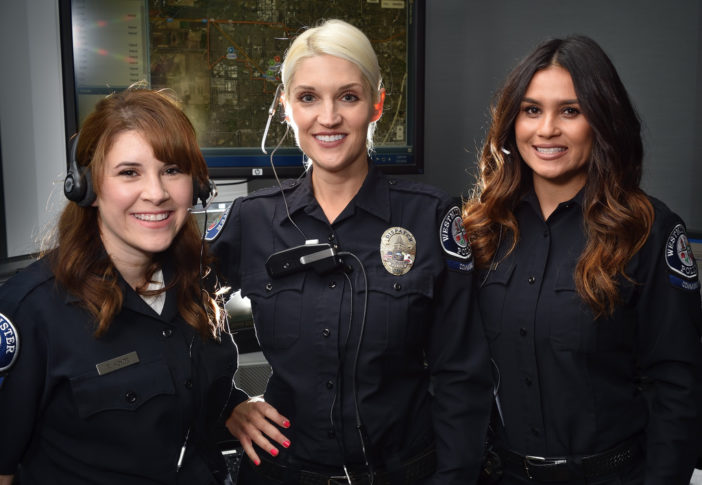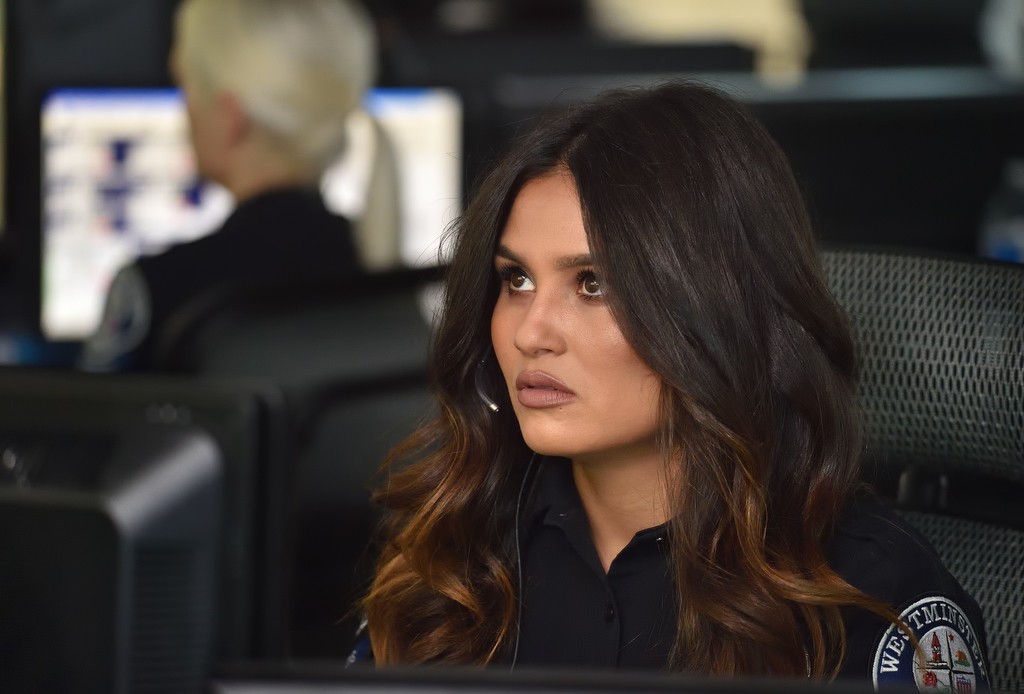The call came in on a Monday night: There was a man inside a movie theater with a gun.
Westminster PD dispatcher Erica Marlow felt a pit in her stomach.
Oh, no. This is it. Active shooter.
“This is the call everyone dreads,” Marlow said.
With mass killings happening across the country, and even as close to home as San Bernardino, Marlow and the rest of the WPD communications team have a plan in place if such a call comes through.
The dispatchers needed more information before they would blast the call out on red channel, which would alert every law enforcement agency in Orange County.
The first caller: There is a man with a gun inside the movie theater.
Can you see the shooter? What does he look like?
Another caller: There is a group of people in an argument outside a movie theater.
OK, that changes things.
Yet another caller: There is a group of people arguing outside and someone pulled a gun.
The picture of what transpired outside a local movie theater on Monday, June 13, started to come into focus.
With every call, the dispatchers compiled more information and finally were able to relay an accurate picture to the responding officers: There was a disturbance outside a movie theater and someone brandished a weapon.
The officers responded and handled it.
“You have to triage the phone lines and get to the people who have the best information,” Marlow said.
And the dispatchers have to get it right — the codes, the description, the exact location and the details — because the officers, and the community, depend on it.
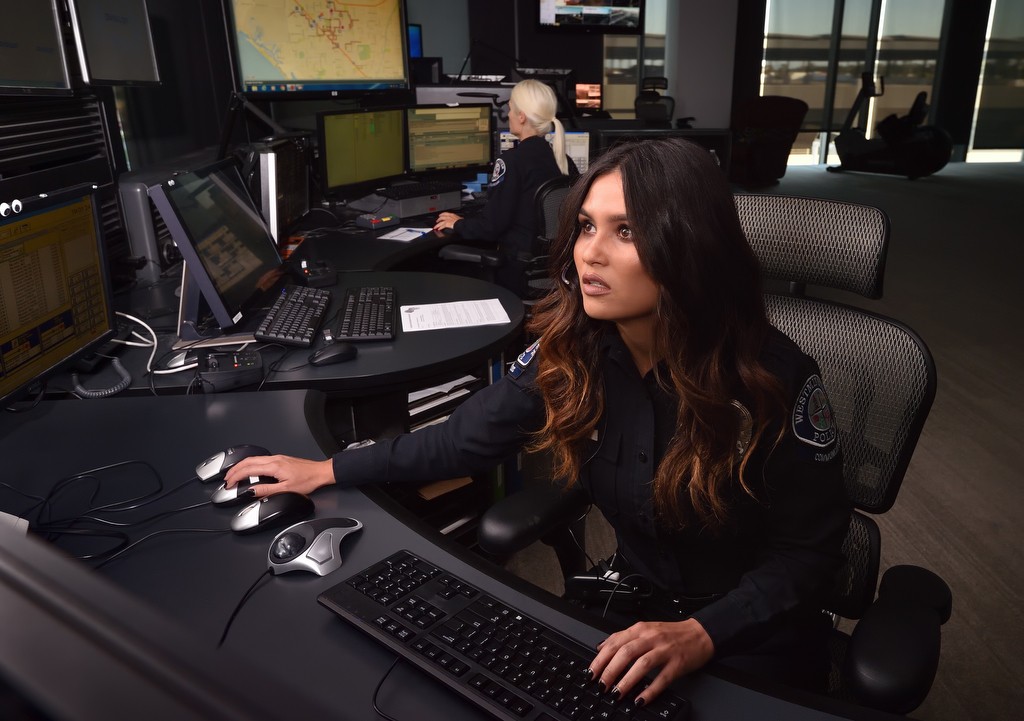
Melorie Madrid of the Westminster PD looks up at the multiple screens as she takes calls at the department’s dispatch center. Behind her is Dispatcher Erica Marlow.
Photo by Steven Georges/Behind the Badge OC
Expert communicators
Dispatchers have to complete a 120-hour course through Peace Officer Standards and Training (POST) before entering into a nine-month training program with Westminster PD.
“We first study maps — a lot of maps — and we need to know all of our codes,” said dispatcher Roxanne Hovde. “We need to know our jurisdiction, major landmarks and then you start taking non-emergent calls.”
In Westminster, dispatch not only fields 911 calls, but also mans the department’s business and non-emergency lines.
After a few days at the first post (call-taking), dispatchers graduate to data entry and taking emergency calls.
After three months there, they then get on the radio to communicate with officers, keep track of their location, and send them to calls.
This post, the dispatchers said, is the most difficult part of the job.
“We are responsible for helping the officer mentally process the call before arriving to the scene,” Marlos said. “We have to be monotone because officers don’t want to hear our emotions; they don’t want to hear our nervousness.”
This is why, on occasion, dispatchers might cut callers off, talk over them to demand certain information or abruptly end a call that isn’t helping with their goal —to get emergency help to those who need it.
“We need information in a certain order and that is what’s overwhelming,” Marlow said. “We have to take control of the call.”
Who, what, where, why and weapons — that’s what they need to know first, followed by details that will help officers identify any suspects.
They don’t want to know what kind of shoes a suspect is wearing before finding out about height, or what pants the suspect has on before learning about the color of shirt.
“If you think about how your eye moves when you’re looking at someone on the street, you’re not looking at their feet first,” Marlow said. “This is why we ask questions in a very specific order.
“If we put a call out to an officer in whatever order a caller gives it, it’s going to be a big sloppy mess.”
Preventing a situation from turning messy is at the crux of what dispatchers are trained to do.
“It’s exciting when it gets busy as long as everyone gets home safe,” Marlow said.
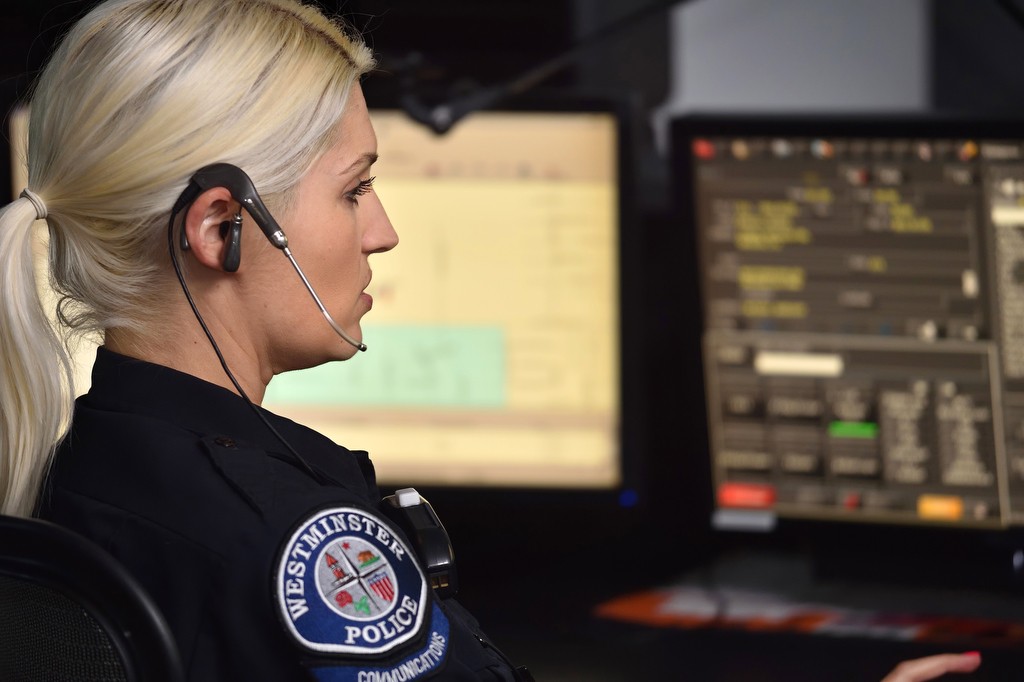
Erica Marlow of the Westminster PD takes calls at the department’s dispatch center.
Photo by Steven Georges/Behind the Badge OC
Keeping everyone safe
The Westminster Police Department dispatchers are master multi-taskers and lightning-fast analysts.
They play relationship and grief counselor, referee and parent.
They’re researchers and trackers, lie detectors and organizers, and sometimes they’re called to act as enforcers or over-the-phone life savers.
In one 12-hour shift, a dispatcher can fulfill all of these roles.
“With this job, it’s not black and white. There are a lot of gray areas,” said dispatcher Melorie Madrid. “You have to use your instinct and really think outside of the box.
“We are one of the busiest cities in Orange County. We just get inundated with calls.”
Over a four-hour span on a recent Sunday graveyard shift, the team of three dispatchers handled (among other things) a panicking family who needed help for their 5-year-old not breathing and reports of a suspicious man lurking in an alley.
There also was a man who called to warn police he and his girlfriend might get into a physical altercation over a botched car purchase and a neighbor asking if his dog had been picked up by police.
There were emergency calls about a man wearing no shirt and causing a disturbance in a shopping center parking lot, and a landowner who called to say his tenant had stopped breathing.
Someone called about their friend who left a party drunk, then called back to let police know the drunk friend had been found, and there also was a guy who worried his motorcycle had been tampered with after he came out and noticed his helmet had been stolen.
The dispatchers also ran license plate checks, ordered blood draws for suspected drunken drivers and ran a repossession request.
“It’s slow tonight,” Madrid commented, stretching back in her chair between calls.
If this is slow, what does busy look like?
Busy is when the screen lights up with so many emergency calls the dispatchers have to navigate through them quickly and efficiently to send help and open the lines for more calls.
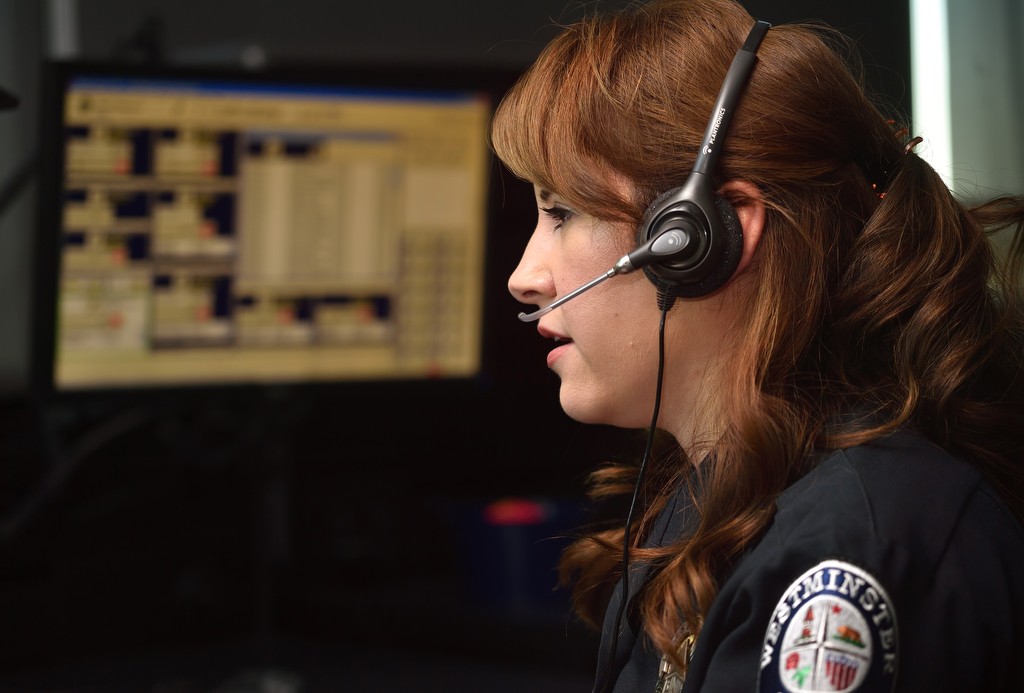
Dispatcher Roxanne Hovde of the Westminster PD takes 911 calls from the public.
Photo by Steven Georges/Behind the Badge OC
They are true emergencies sometimes; sometimes not so much.
This time of year, reports of fireworks as the most non-emergent 911 calls the WPD dispatchers take. But there are also people who like to call 911 to report barking dogs, UFOs or to complain that their neighbor is flying a drone.
“We get so many of these types of calls every single day,” Marlow said.
Sometimes the callers are polite, other times they are hostile. Dispatchers get yelled and cursed at nearly every shift.
“I detach myself and know that I’m just doing my job,” Madrid said. “You can’t take anything too personal.”
Added Marlow: “You have to have thick skin with this job.”
These are the kinds of the things the dispatchers find humor in, but much of what they handle in the day-to-day is sobering.
Calls dealing with children or domestic violence victims can weigh heavy on Westminster’s communications team.
“A lot of the time, you don’t get closure on these calls,” Marlow said. “The department is really great if something major happens to pull us in and debrief so we can hear about everything that happened.
“There are certain calls that just get to you.”
The worst of the worst, they agreed, is when one of their own is in trouble.
“The scariest part of this job is to hear that an officer is in pursuit or shots have been fired,” Madrid said. “You care for your unit so much, so those situations are hard.”
But they stay calm. They stay monotone. And they do the work they can to ensure each officer goes home to their loved ones.
“Our job is to get those officers home safe,” Marlow said. “We’re a team. We’re a family.”
 Behind the Badge
Behind the Badge
